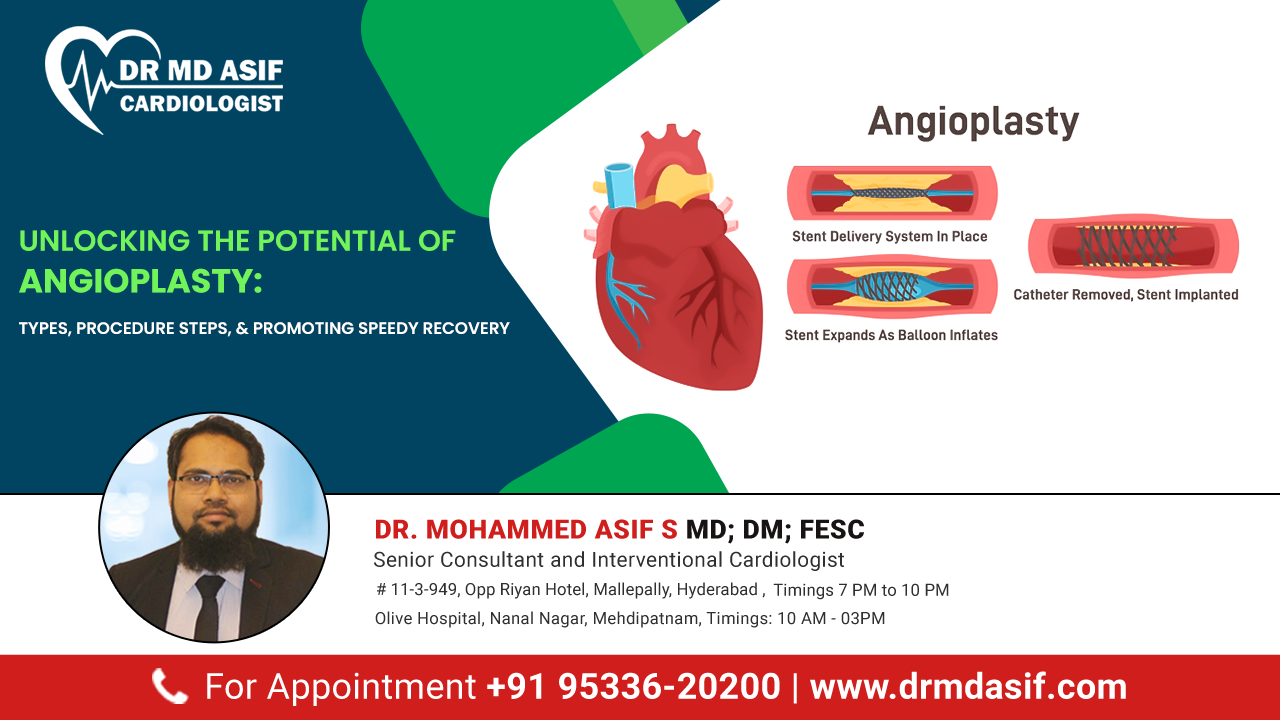Call us for any question
9533620200, 8179002888Meds Super Speciality Hospital
MallepallyTimings: 7 pm to 10 pm
mohammed4248asif@gmail.com

Blog s
Unlocking the Potential of Angioplasty: Types, Procedure Steps, and Promoting Speedy Recovery

Updated at: 09 Jun 2023
Introduction
For those suffering from blocked arteries, angioplasty is often an effective remedy for restoring proper circulation. It is a standard treatment for narrowed or blocked arteries, which is also known as percutaneous coronary intervention, or PCI. This procedure creates more space inside arteries that have plaque buildup and reduces the risk of heart attacks. During angioplasty, a surgeon uses a tube to insert a balloon or stent into the affected artery, opening the blockage. Here we will explore an overview of angioplasty, including its types, procedure steps, and recovery.
What is angioplasty?
People who are suffering from any kind of coronary artery disease, they may need coronary angioplasty surgery.
Angioplasty is a simple and effective procedure to unblock your arteries. By using a minimally invasive technique, healthcare providers can open up tight spots in your arteries and improve blood circulation. This process is also known as balloon angioplasty, which saves many lives.
Types of angioplasty
Two types of angioplasty are there.
First is the balloon angioplasty, which uses an inflating balloon to remove plaque and relieve artery blocking. This option is only used when angioplasty stent placement is not possible.
Second is the stent placement, which deploys a wire mesh tube. That helps to maintain an open artery after angioplasty. For angioplasty, stents come in bare metal or drug-eluting varieties, with the latter being more effective at preventing another blockage.
Drug-eluting stents are now commonly used, making bare metal ones less popular.
Also read: AICD Implantation in Hyderabad
Preparing for Angioplasty: What You Need to Know
Angioplasty is a type of surgery that is minimally invasive, but it is still important to prepare properly. Your doctor will provide specific instructions for you to follow before the angioplasty surgery procedure.
Ensure to inform your doctor of any medications or supplements you are taking. Depending on your situation, you may need to stop taking certain drugs, particularly blood thinners, before the surgery.
You may also be required to fast for a few hours before the procedure, as sedation will be necessary. The contrast dye used during angioplasty can impact kidney function, so you may need to undergo kidney tests beforehand.
Experience the angioplasty procedure.
Before the angioplasty procedure, you will receive local anesthesia around where the catheter will enter your body. Then your healthcare professional will clean the area first. After this, they will enter that cather typically through the groin, sometimes the wrist.
Your doctor will then carefully insert a catheter into your artery, directing it toward the coronary artery with the help of an X-ray.
Using a contrast dye, the doctor will identify blockages and insert a second catheter with a guidewire, often with a balloon at the tip.
Once positioned, the balloon inflates, expanding the artery and pushing plaque buildup out of the way, potentially followed by placing a stent to keep the artery open.
Recovering from angioplasty procedure: What to expect
After your angioplasty procedure, your care provider will remove the catheters and apply a bandage to the site of entry. You might experience mild discomfort or notice a bruise in the area. Also, there is a chance of light bleeding, which will be managed immediately.
Complications after angioplasty procedure:
Angioplasty is a common medical procedure, and it is relatively safe. But there are still some risks involved. The complication rate can vary depending on your circumstances.
Potential angioplasty complications include:
Emergency bypass grafting during or after the procedure
Heart attack, stroke, or abnormal heart rhythm
Damage to blood vessels or kidneys
Blood clots or bleeding
Chest pain or a repeat blockage
Older adults or those with a history of heart failure, kidney disease, or several blocked arteries may be at greater risk for these complications. Do not let fear hold you back from seeking the treatment you deserve. Be sure to speak to your doctor about your risks before making any decisions.
Recovery time after angioplasty surgery
Recovering from angioplasty surgery involves staying at the hospital for a few hours or overnight. Your healthcare provider will prescribe medications and advise you on how much activity is safe. Because anesthesia is used, you will need someone to drive you home. Once home, rest and hydration are vital, and you must avoid exertion for 24 hours. Your provider may prescribe blood thinners, which you should take as directed and not discontinue without consulting them first.
Do not miss the critical follow-up visit after angioplasty surgery. During this check-in, your doctor will evaluate your progress and tweak your medication regimen if necessary. Also, they collaborate with you on a long-term plan to keep your heart healthy.
Conclusion
Angioplasty has been proven to be a major advancement in treating cardiovascular diseases. After discussing angioplasty in detail, it is clear why this minimally invasive technique is becoming increasingly popular. The procedure can revolutionize how blockages are cleared in a safe way while promoting speedy recovery. However, a healthy lifestyle is essential to maintain good health after an angioplasty procedure. Adopting the right dietary habits and engaging in physical activity as healthcare providers prescribe are all imperative steps. If you are confused about whether angiography is good for you or not, then consult with DrMdasif. He is one of the best angioplasty doctors in Hyderabad. So get in touch with his team of doctors to learn more about the right treatments for your heart health today.
Comments

Be the first to Comment
Latest Post
-
⇨10 ways to control high blood pressure without medication
-
⇨Know the Dos and Donts after heart bypass surgery
-
⇨Angioplasty vs CABG : All You Need to Know
-
⇨A Closer Look at Angiography Risks and Benefits
-
⇨What is the difference between angioplasty and angiogram?
-
⇨Connections Between Depression and Heart Disease: What You Need to Know
-
⇨Finding the Best Cardiologist in Hyderabad: Tips and Tricks
-
⇨How to Recognize the Signs of a Heart Attack or Heartburn
-
⇨Why Are Permanent Pacemakers Necessary, and what to expect during surgery?
-
⇨The Impact of Patent Ductus Arteriosus on Quality of Life| Dr Asif
-
⇨What Are the Causes, Risk Factors, and Treatments of Ventricular septal defect?
-
⇨Exploring the Pacemaker Surgery Cost in Hyderabad: What You Need to Know.
-
⇨Discovering the Different Types of ASD: What You Need to Know
-
⇨The TAVR Surgery Cost in Hyderabad: A Comprehensive Guide| Dr. Asif
-
⇨Exploring the Advantages of TAVR: What You Should Know
-
⇨Visualizing Heart Health: An In-Depth Look at Coronary Angiogram
-
⇨Unlocking the Potential of Angioplasty: Types, Procedure Steps, and Promoting Speedy Recovery
-
⇨How Cardiac Resynchronization Therapy Device Work: A Complete Guide
-
⇨AICD Implantation in Hyderabad: A Comprehensive Guide for Heart Patients
-
⇨Pacemaker Surgery and Its Types: A Comprehensive Overview




Leave a reply